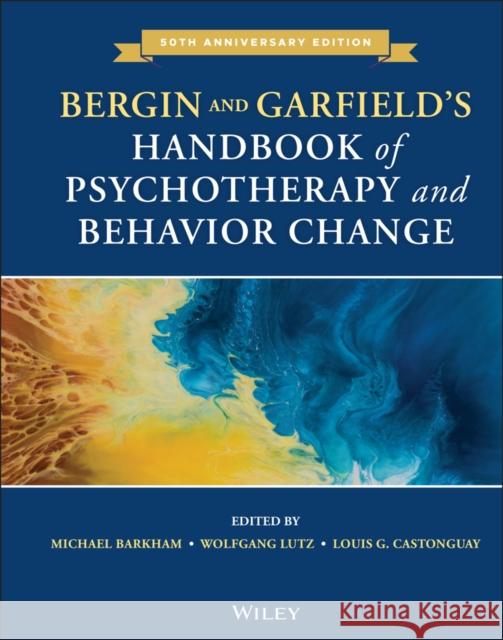Bergin and Garfield's Handbook of Psychotherapy and Behavior Change » książka



Bergin and Garfield's Handbook of Psychotherapy and Behavior Change
ISBN-13: 9781119536581 / Angielski / Twarda / 2021 / 848 str.
Bergin and Garfield's Handbook of Psychotherapy and Behavior Change
ISBN-13: 9781119536581 / Angielski / Twarda / 2021 / 848 str.
(netto: 536,36 VAT: 5%)
Najniższa cena z 30 dni: 550,83
ok. 16-18 dni roboczych.
Darmowa dostawa!
"This epic treatise, after fifty years, reflects the original authors' modeling of thorough research, penetrating interpretations, and ideas for improving the efficacy of therapeutic interventions. Hopefully, forth-coming generations of students, faculty and clientele will thus benefit from the decades of earnest labor invested in their behalf."- Albert Bandura, PhDDavid Starr Jordan Professor Emeritus of Social Science and PsychologyStanford UniversityPast President, American Psychological AssociationRecipient, USA National Medal of Science"Bergin and Garfield's Handbook of Psychotherapy and Behavior Change has been my lodestar throughout my professional career. I always turned to it when I wanted to know the latest thinking in the field: what therapies were being explored, what process variable, what methodologies? I was consistently impressed by the Handbook's inclusion of newer therapeutic approaches as they were developed, newly conceptualized processes of change and methods to explore them. And, always, attention to important issues of diversity. The 50th year Anniversary edition continues the remarkable trajectory begun by Bergin and Garfield and maintained by successors."-Irene Elkin, Professor EmeritaThe University of ChicagoCrown Family School of Social Work, Policy, and Practice
ContentsLists of ContributorsForewardPrefaceContents of all Handbook EditionsPart 1: History and MethodsChapter 1: Traditions and New Beginnings: Historical and Current Perspectivees on Research in Psychotherapy and Behavior ChangeWolfgang Lutz, Louis G Castonguay, Michael J Lambert, and Michael BarkhamChpater 2: Methodological Foundations and Innovations in Quantitative Psychotherapy ResearchScott A Baldwin and Simon B GoldbergChapter 3: The Conceptualization, Design, and Evaluation of Qualitative Methods in Research on PsychotherapyHeidi Levitt, John McLeod, and William B StilesPart ll: Measuring and Evidencing Change in Efficacy and Practice-Based ResearchChapter 4: Measuring, Predicting, and Tracking Change in PsychotherapyWolfgang Lutz, Kim de Jong, Julian A Rubel, and Jaime DelgadilloChapter 5: The Efficacy and Effectiveness of Psychological TherapiesMichael Barkham and Michael J LambertChapter 6: Practice-Based Evidence- Findings from Routine Clinical SettingsLouis G Castonguay, Michael Barkham, Soo Jeong Youn, and Andrew C PagePart lll: Therapeutic IngredientsChapter 7: Patient, Therapist, and Relational FactorsMichael J Constantino, James F Boswell, and Alice E CoyneChapter 8: Psychotherapy Process- Outcome Research: Advances in Understanding Casual ConnectionsPaul Crits-Christoph and Mary Beth Connolly GibbonsChapter 9: Therapist Effects: History, Methods, Magnitude, and Characteristics of Effective TherapistsBruce E Wampold and Jesse OwenChapter 10: Training and Supervision in Psychotherapy: What We Know and Where We Need to GoSarah Knox and Clara E HillChapter 11: Qualitative Research: Contributions to Psychotherapy Practice, Theory and PolicyJohn McLeod, William B Stiles, and Heidi M. LevittPart IV: Therapeutic Approaches and FormatsChapter 12: Research on Dynamic TherapiesJacques P Barber, J Christopher Muran, Kevin S McCarthy, John R Keefe and Sigal Zilcha-ManoChapter 13: Research on Humanistic-Experiential Psychotherapies: Updated ReviewRobert Elliot, Jeanne Watson, Ladislav Timulak, and Jason SharbaneeChapter 14: Cognitive, Behavioral and Cognitive Behavioral Therapy (First and Second Waves)Michelle G Newman, W Stewart Agras, David A F Haaga, and Robin B JarrettChapter 15: Mindfulness and Acceptance-Based TreatmentsEvan M Forman, Joanna J Arch, Jonathan B Bricker, Brandon A Guadiano, Adrienne S Jurascio, Shireen L Rizvi, Zindel V Segal, and Kevin E VowlesChapter 16: Systemic and Conjoint Couple and Family Therapies: Recent Advances and Future PromiseMyrna L Friedlander, Laurie Heatherington, and Gary M DiamondChapter 17: Efficacy of Small Group Treatments: Foundation for Evidence-Based PracticeGary M Burlingame and Bernhard StraussChapter 18: Psychotherapy for Children and Adolescents: From Efficacy to Effectiveness, Scaling and PersonalizingMei Yi Ng, Jessica L Schleider, Rachel L Horn, and John R WeiszPart V: Increasing Precision and Scale in the Psychological TherapiesChapter 19: Personalized Treatment ApproachesZachary D Cohen, Jaime Delgadillo, Robert J DeRubeisChapter 20: Combining Psychotherapy and MedicationsSteven D Hollon, Paul W Andrews, Matthew C Keller, Daisy R Singla, Marta M Maslej and Benoit H MulsantChapter 21: Internet Approaches to Psychotherapy: Empirical Findings and Future DirectionsGerhard Andersson and Thomas BergerChapter 22: Extending the Scalability and Reach of Psychosocial InterventionsAlan E KazdinPart VI: Towards the FutureChapter 23: Epilogue: Prevalent Themes, Predictions, and RecommendationsLouis G Castonguay, Catherine Eubanks, Shigeru Iwakabe, Mariane Krause, Andrew C Page, Sigal Zilcha-Mano, Wolfgang Lutz, and Michael BarkhamAuthor IndexSubject Index
Michael Barkham, PhD, is Professor of Clinical Psychology at the University of Sheffield, UK. He has over 35 years of experience researching the processes and outcomes of psychological therapies, focusing on the development of outcome measures, conducting pragmatic trials, and the analyses of large practice-based data sets.Wolfgang Lutz, PhD, is Professor of Clinical Psychology and Psychotherapy at the University of Trier, Germany. His research focuses on change in psychotherapy and aims at supporting personalized decision-making based on empirical data. He is a former editor of Psychotherapy Research and president-elect of the Society for Psychotherapy Research.Louis G. Castonguay, PhD, is Liberal Arts Professor of Psychology in the Department of Psychology at Penn State University, USA. His research focuses on factors related to the process and impact of psychotherapy. He is also involved in practice-oriented research and practice research networks. He has served as president of the Society for Psychotherapy Research.
1997-2026 DolnySlask.com Agencja Internetowa
KrainaKsiazek.PL - Księgarnia Internetowa









